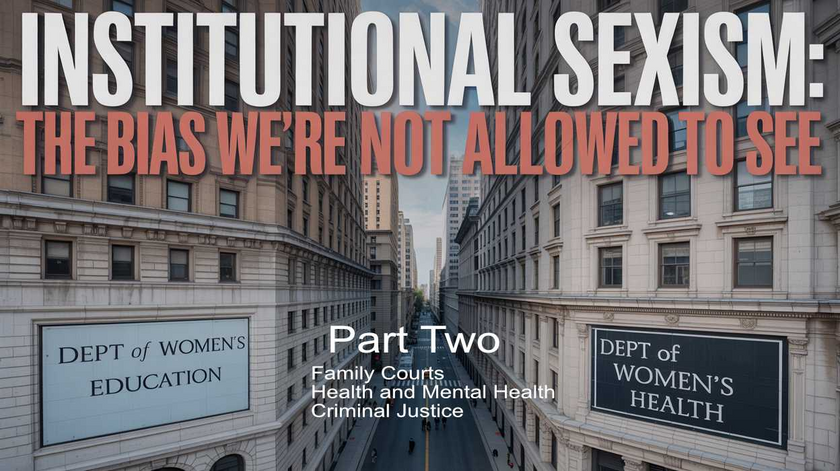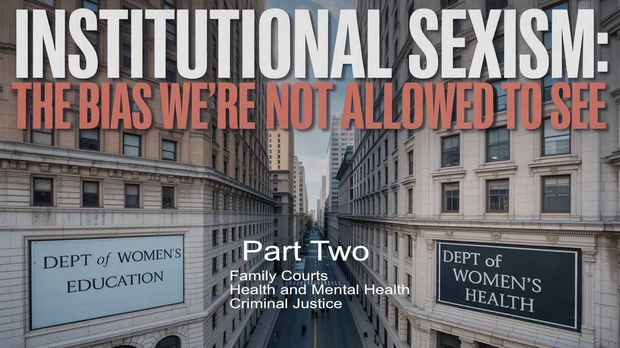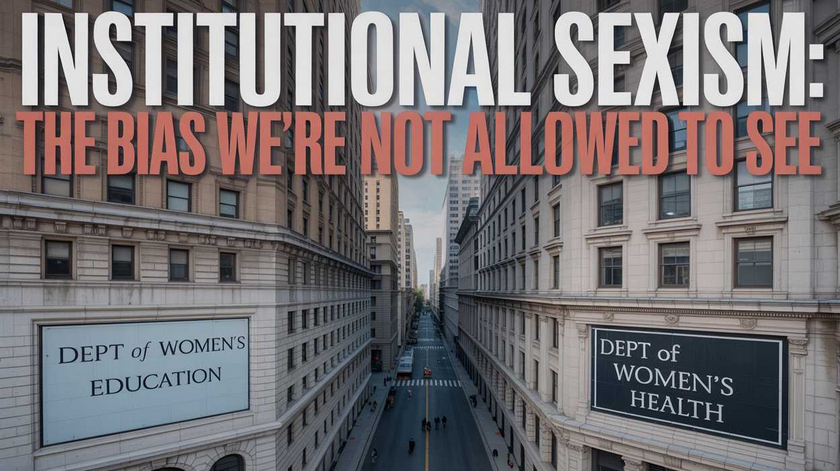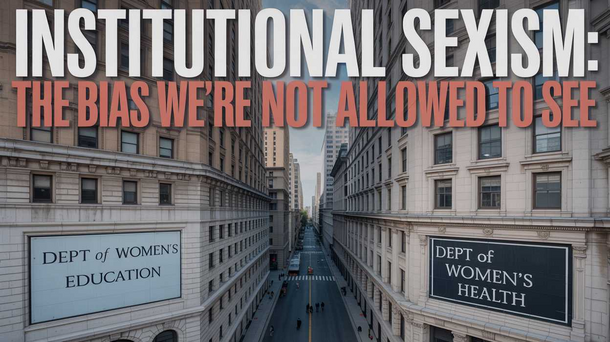When the Nursery Governs the Nation
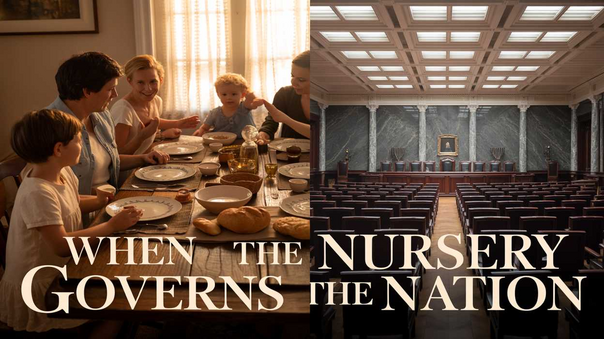
The Harper family lived in a modest two-story house at the end of a quiet street. There was a father, a mother, and three children: 14, 11, and 6.
They were not extraordinary people. They forgot appointments. They argued about screen time. They got tired at the end of long days.
But something about their home felt solid.
There was warmth. There was order. There was a sense that everyone knew where they stood.
Why?
Because they followed rules that make families work.
1. Belonging Came Before Performance
When the six-year-old spilled milk for the third time that week, no one convened a tribunal. She wasn’t asked whether she had “earned” dinner. She was fed because she belonged.
When the 14-year-old slammed a door and shouted something regrettable, there were consequences. But there was no threat of expulsion.
Membership in the family was unconditional.
Belonging preceded merit.
2. The Strong Carried the Weak
The parents worked. The children did not. The younger ones consumed far more than they produced.
No one kept a ledger calculating whether the six-year-old had contributed enough to justify her meals.
That would have been absurd.
Family is not based on reciprocity. It is based on duty and love.
The strong carry the weak—temporarily—so that the weak can grow strong.
3. Feelings Had Moral Weight
If one child was hurt, everything paused. If someone cried, the room shifted.
Emotional pain mattered.
The parents were especially attentive to vulnerability.
The most fragile voice in the room often received the most care.
No one found this unfair. It was simply what families do.
4. Mercy Tempered Justice
Rules existed. But context mattered. “Why did you do that?” was asked before consequences were decided.
Intent mattered.
Fatigue mattered.
Developmental stage mattered.
Justice inside a family is personal, not mechanical.
And because of these principles, the Harper family flourished.
The children grew.
Mistakes were survivable.
Love was assumed.
Authority was trusted.
Now imagine something strange.
The Same Rules Applied to the Whole Town
Suppose the mayor of the town announced:
“We have discovered that the Harper family’s way of operating produces harmony. Therefore, we will run the entire town by the same principles.”
It sounded compassionate.
It sounded humane.
It sounded morally advanced.
And so they tried.
1. Belonging Before Contribution
Citizens were told:
“Your needs come first. Contribution is secondary.” Resources were increasingly distributed according to distress rather than productivity.
Those who expressed greater need received greater priority.
Those who produced more were told not to focus on reward. After all, in a family, the strong carry the weak.
At first, this felt noble.
Over time, effort subtly declined.
Not dramatically. Not all at once.
Just enough.
2. Feelings as Public Authority
Town meetings began centering on emotional harm.
If a policy made someone feel excluded, it was reconsidered.
If a group felt historically wronged, that feeling carried moral authority.
Facts still mattered—but feelings often overruled them.
Gradually, public debate shifted from “What works?” to “Who is hurting?”
And the most distressed voice carried the most influence.
3. Mercy Without Impartiality
In the Harper home, mercy worked because everyone was bound together for life.
In the town, relationships were not intimate. They were institutional.
Yet rules began bending depending on who committed the offense.
Context expanded for some.
Responsibility tightened for others.
The law stopped feeling blind.
Trust began to erode.
4. The Quiet Burnout
At the edge of town lived Daniel.
He owned a small plumbing company.
He worked long hours. Paid his taxes. Trained apprentices. Fixed broken pipes in winter storms.
When policies shifted toward distributing resources based primarily on need, Daniel didn’t complain. He believed in helping people.
But over time he noticed something.
His taxes rose steadily.
Regulations multiplied.
Clients who didn’t pay were increasingly protected.
When he raised concerns, he was told, gently, that others were hurting more.
He kept working.
But something changed.
He stopped hiring apprentices.
He stopped expanding.
He stopped volunteering for civic boards.
He still contributed.
Just less.
Not out of anger.
Out of fatigue.
Multiply Daniel by thousands.
The town did not collapse in flames.
It simply slowed.
5. The Collapse of Incentive
In a family, parents sacrifice because love binds them.
In a town, producers require fairness and predictability.
When contribution no longer reliably led to reward,
and distress reliably led to benefit,
human behavior adjusted.
Not because people were evil—
but because incentives shape action.
Gradually.
Predictably.
Why It Worked at Home But Failed in Public
The Harper family worked because:
It was small.
It was intimate.
It was bound by lifelong loyalty.
It operated through asymmetrical responsibility.
It suspended strict reciprocity for the sake of development.
The town required something different:
Impersonal fairness.
Predictable incentives.
Equal accountability under law.
Reciprocal contribution.
Boundaries that protect the whole.
The family is designed to nurture dependency.
Society is designed to transition dependency into responsibility.
The family suspends survival logic so children can grow.
Society must enforce survival logic so civilization can survive.
Both Systems Are Necessary
This is not an argument against families.
Nor is it an argument against compassion.
The family is sacred precisely because it is an exception.
It is the one place where love precedes merit.
And society exists so that families can exist.
Without the productive, disciplined structures of the public sphere, there would be no stable homes to shelter children.
Without the nurturing, sacrificial structures of the family, there would be no mature adults capable of sustaining society.
They are not enemies.
They are interdependent.
But they are not interchangeable.
When the rules of the nursery become the rules of the nation, compassion expands—but accountability weakens.
And when accountability weakens for long enough, even compassion becomes unsustainable.
The tension described in this story is not hypothetical. It is the central argument of David Shackleton’s remarkable new book, Matrisensus: Masculine Collapse and Feminine Shadow.
Shackleton argues that Western society is increasingly governed not by the logic of society, but by the logic of the family — and that this shift carries profound consequences for law, culture, and moral authority.
Tomorrow, I’ll be joined by David Shackleton, Janice Fiamengo, Warren Farrell, and Lisa Britton for a conversation exploring these ideas in depth. If this story resonates with you, you won’t want to miss it.
Men Are Good




